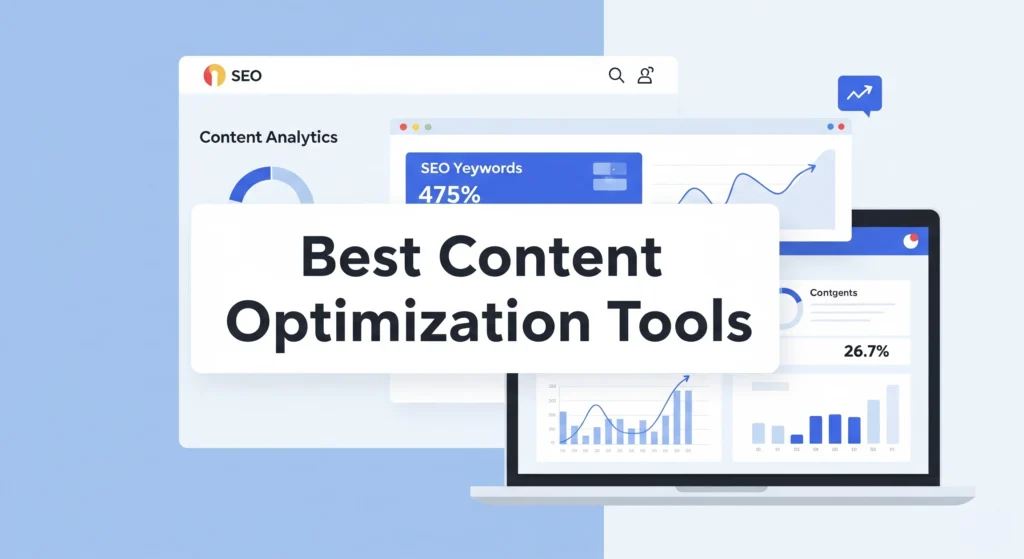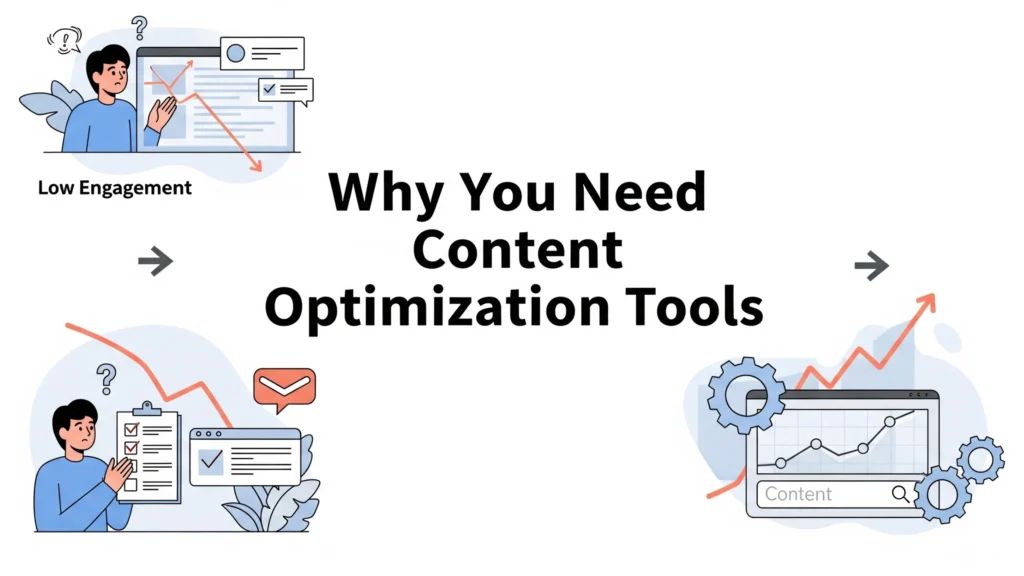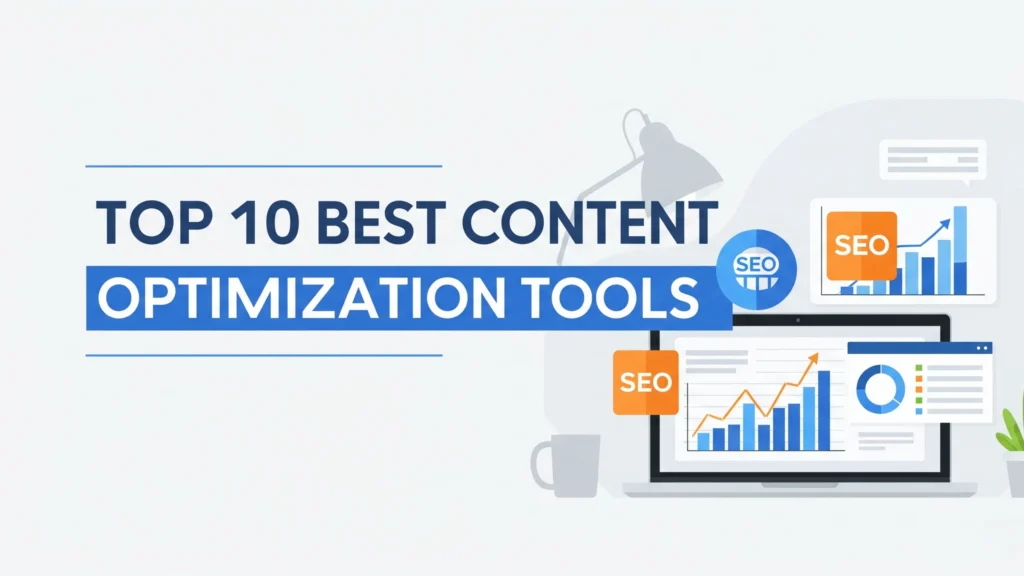So you wrote a blog post, added images, used your main keyword, and hit publish. But no traffic coming in? Don’t worry, this happens to most people. Writing good content is just the start. The real game begins when you start optimizing that content properly.
Search engines like Google are not only looking at what you write but also how well it’s written, how fast your site loads, how people engage with your content, and so on. If your content is not fully optimized, it might stay hidden somewhere on page 10 of search results, and honestly, nobody goes there.

That’s why content optimization is super important. It’s the process where you take your blog or article and improve it so that Google understands it better, users enjoy it more, and your ranking goes higher. And guess what? You don’t have to do all of this manually. There are amazing tools that can help you do this fast and smart.
In this guide, I’ll walk you through the best content optimization tools you can try right now. Whether you’re just starting out or already running a blog or website, these tools can seriously level up your content and help you get that sweet traffic you’re waiting for.
What Is a Content Optimization Tool?
Okay, so here’s the thing. You write blog or article, right? But just writing is not enough. If your content not show on Google, then what’s the use? That’s why we need content optimization tools. These tools help your content do better. Like they tell what you should fix, what keywords you missing, how long it should be, and even how others are doing.
It’s like getting small tips from a smart friend who knows what Google likes. You don’t have to guess. Just follow what the tool says. Some tools show score, some give keyword ideas, some check grammar, some tell if your post is easy to read or not.
And don’t worry, you don’t need to be expert. Even if you just started blogging or doing SEO, these tools are super beginner friendly. You just paste your content and see what to improve. Saves time and makes your content ready for better ranking.
So if you want more people to see your content, more clicks, more views then content optimization tool is like your best buddy in the background.
Why You Need Content Optimization Tools
Let me be honest with you. Just writing something and posting online is not enough anymore. There are already millions of blog posts out there. If you want your content to show on Google and reach people, then you gotta do smart work. That’s where content optimization tools help.

These tools tell you small things that make big difference. Like, maybe your post is missing important keywords, or maybe your title is not catchy, or maybe your content is too short. The tool will point it out. You don’t have to guess anything. It’s like having someone guide you on what to fix.
Also, it saves a lot of time. Instead of checking everything manually, these tools give full report in one click. Some tools even compare your post with top-ranking blogs, so you can understand what you need to beat them.
So these tools, they don’t just help with keywords. They also fix small things like grammar, make your blog easy to read, show what’s missing, and tell if your content is copied or not. Simple stuff, but useful. If you write blog or just learning SEO, these tools can save your time. You don’t need to do everything perfect. Just follow what tool say, fix little by little, and done.
How Content Optimization Tools Help in SEO Growth
If your blog or website is not growing, maybe your content is not fully ready for SEO. That’s where these tools come in. They make your content smart, not just long.
Most tools check your keywords and show if they are ranking well or not. They also tell if your content is missing something that Google loves, like headings, related terms, or internal links. So you don’t need to guess, just follow the suggestions and fix things.
Good content tools also help in keeping your blog fresh. They remind you when content is outdated or when your post is losing rank. You update it again and get back your spot on Google.
One more thing, these tools save your time. Instead of checking 5-6 websites, you see everything in one place. Keyword, backlinks, competition, score all in a single dashboard.
So if you’re serious about growing traffic, content optimization tools can really help. They guide you step by step. No need to be SEO expert. You just need to follow what the tool says and keep improving your content.
Top 10 Best Content Optimization Tools

| Tool Name | Best For | Platform | Pricing |
|---|---|---|---|
| Surfer SEO | On-page SEO content scoring | Web | Starts at $89/mo |
| Frase | AI-driven content briefs | Web | From $14.99/mo |
| MarketMuse | Content planning + auditing | Web | Free plan + Paid from $149/mo |
| Clearscope | Enterprise content teams | Web | Starts at $170/mo |
| Dashword | Beginners + solo bloggers | Web | Free plan + Paid from $39/mo |
| SEMrush Writing Assistant | SEO content in WordPress | Web + WP plugin | Included in SEMrush plan |
| Scalenut | AI + long-form content | Web | Starts at ₹899/mo |
| Outranking | Content outlines + briefs | Web | Starts at $79/mo |
| NeuronWriter | Budget-friendly SEO tool | Web | Starts at $19/mo |
| WriterZen | Topic discovery + cluster | Web | Starts at $27/mo |
Detailed Overview of Each Tool
1. Surfer SEO
Surfer SEO is for folks who want their blog posts or landing pages to actually rank. It checks what’s already ranking for your topic and then gives you a real-time content score while writing. It tells you how many words to write, which keywords to add, and even how many headings or images to use. So instead of guessing, it helps you write exactly what Google wants to see. If you’re serious about on-page SEO, this tool gives you a clear structure to follow.
2. Frase
Frase is all about saving your time when planning content. It quickly pulls data from the top Google results and creates an outline or content brief for you. You don’t need to open 10 tabs or overthink your article. It also has an AI writer, but the best part is how it helps you figure out what to include in your content so you don’t miss anything important. Good for bloggers and marketers who want smart content research fast.
3. MarketMuse
MarketMuse is more advanced. It looks at your whole website and tells you where the content gaps are. Then it shows what topics or subtopics you should write next. It’s like a full content planner and optimizer in one. Great for people who handle big sites or run content teams. But it’s on the expensive side, so usually better for serious projects or agencies with a budget.
4. Clearscope
Clearscope is very clean and simple to use. You paste your content inside, and it gives you a grade based on how well it’s optimized. It shows which keywords to add, how relevant your text is, and gives writing tips too. Many large teams use it because it’s easy to share results with writers and editors. The pricing is high, but the quality of suggestions is really strong.
5. Dashword
Dashword is like a lighter version of Clearscope. It gives you a content score, tells you what keywords you missed, and even helps with outlines. The interface is beginner-friendly. If you’re a solo writer or small blogger, this one gives a lot of value for less price. You don’t need to be a technical SEO expert to use it either.
6. SEMrush Writing Assistant
If you’re already using SEMrush, their writing assistant is a handy bonus. It works right inside Google Docs or WordPress. You type your content, and it gives SEO feedback on the go — like readability, keyword use, and tone. It’s not a full-blown content optimizer like Surfer or Clearscope, but it’s solid for quick checks and fixes inside your daily workflow.
7. Scalenut
Scalenut mixes AI writing with content optimization. It gives outlines, auto-writes intros or full paragraphs, and helps you improve your content score as you go. A good thing is it works well for long-form content like guides or product reviews. Plus, it’s made for the Indian market too, so pricing is budget-friendly and the features are quite decent.
8. Outranking
Outranking is more focused on building structured content that answers search intent. It gives deep keyword research, auto outlines, and optimization tips. You can also generate content in small steps using AI, like intro, FAQ, and so on. It’s helpful for people who want better control over what the AI writes, instead of random full articles.
9. NeuronWriter
NeuronWriter is a budget pick with solid features. You paste your topic, and it checks what your competitors are doing. Then it tells you what to add, how long the article should be, and which words to focus on. The interface is simple and clean, and it’s becoming popular among new bloggers because the pricing is low but it does the job well.
10. WriterZen
WriterZen helps with content topic discovery. Instead of jumping straight into writing, it first shows you keyword clusters and related topics, so you can plan full content silos. Once you pick a keyword, it helps you build outlines and optimize content too. It’s good for people who want to grow traffic by covering topics fully, not just one article at a time.
How to Choose the Right Content Optimization Tool
Alright, so now we know some of the top tools out there. But wait, how do you even choose the right one? Like, seriously, there are so many. Some are super fancy, some are simple, and some just confuse you with too much stuff. So let me make this super easy for you.

First thing, what kind of content are you working on? If you’re just writing your own blog or small posts now and then, you don’t need big paid tools. You can start with something free or cheap. Tools like NeuronWriter or Dashword do the job. They help you improve your writing and suggest better keywords, that’s all you need when starting.
Now if you’re doing serious content like for clients, or you wanna beat your competition on Google, then go for something smarter. Like Surfer SEO, Frase, or even Scalenut. These tools show you what’s ranking already and help you write content just like that but better.
Also ask yourself do you want something simple or you okay with graphs and SEO numbers? Some tools like MarketMuse or Clearscope give heavy data. Looks cool, but can feel too much. So if you’re new, pick tools that feel easy to understand. No need to stress.
And yeah, don’t forget money. Some tools cost a lot every month. No point in paying for features you never use. Always test the free plan first if it’s available. Later if you really like it, then go for the paid one.
End of the day, don’t go after “best tool” go after “what feels right for you.” Try 2-3 tools, see which one feels easy, helpful, and fits your way of writing. That’s the best tool for you. Simple.
FAQs About Content Optimization Tools
1. Which one tool is best for beginners like me?
If you new, then better go with Ubersuggest or NeuronWriter. These are easy. You just copy your topic or content, paste inside, and they guide you what to fix. You no need to be SEO expert. Very simple to use.
2. Free tools are enough or should I buy?
Free tools help little. Like they show keyword or give small score. But paid tools give full help like full content score, live suggestions, your competitor data. So if you doing blogging seriously, better use paid one. But in starting, free one is okay.
3. Can I use more than one tool together?
Yes yes, you can. I also use 2-3 tools sometimes. Like I write in Grammarly, then check SEO with NeuronWriter, and track keyword in GSC. You mix as per your need. No problem at all.
4. These tools only for blog or I can use for other things?
You can use anywhere. Not only blog. If you write for YouTube, product page, online shop, social post, you can use same tools. Wherever you need better content, these tools help you.
conclusion
Now you know what content optimization tools really do and how they can help you. If you just writing and waiting for traffic, it’s not going to work like that. You need smart tools that tell you what missing, what to improve, and how to beat others on Google.
I shared top tools, easy tools, tools for different use. You don’t need to be expert. Just pick one, test it, and keep improving your content. Even I started like that slow and learning. But tools make it easier.
If budget is low, try free version. If you serious, invest in good one. Just don’t sit and wait. Google only ranks smart content now.
So go now, pick your tool, and make your content ready to rank. Any confusion? Read again or save this page. I’m here to help.
Read Also: Best Digital Communication Tools to Use in 2026
1 thought on “Best Content Optimization Tools to Boost Your Rankings in 2026”